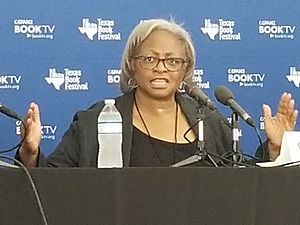Carol Anderson facts for kids
Quick facts for kids
Carol Anderson
|
|
|---|---|

At the Texas Book Festival on November 5, 2017
|
|
| Born |
Carol Elaine Anderson
June 17, 1959 |
| Nationality | American |
| Alma mater |
|
| Occupation | Professor |
|
Notable work
|
White Rage: The Unspoken Truth of Our Racial Divide |
| Board member of | National Economic & Social Rights Initiative (NESRI) |
| Scientific career | |
| Institutions | Emory University |
Carol Elaine Anderson (born June 17, 1959) is an American professor and writer. She teaches African American Studies at Emory University. Her work focuses on how government rules affect race, fairness, and equality. In 2023, she was chosen to join the American Philosophical Society, a very old and respected group.
Contents
Learning and Degrees
Carol Anderson studied at Miami University in Oxford, Ohio. She earned her first degree in 1981 and a master's degree in 1983. Later, she earned her PhD in history from Ohio State University in 1995. In 2005, she received a special award to study at Harvard University. There, she worked on her book, Bourgeois Radicals: The NAACP and the Struggle for Colonial Liberation, 1941–1960.
Her Work and Books
Early Teaching Career
Before joining Emory, Professor Anderson taught history at the University of Missouri in Columbia. She was recognized for her excellent teaching in 2001. In 2009, she became a professor in the African American Studies department at Emory University in Atlanta, Georgia.
Understanding "White Rage"
In 2014, Carol Anderson wrote an article for The Washington Post. She explained that the problems after a shooting in Ferguson, Missouri, were a sign of "white rage." This term describes a strong negative reaction when African Americans make progress. Her article was very popular and led to a book deal.
Her book, White Rage: The Unspoken Truth of Our Racial Divide, explores the history of unfair treatment and backlash against Black people in the United States. The book became a best-seller and was praised by many newspapers. It also won the 2016 National Book Critics Circle Award for Criticism.
Views on Voting Rights
Professor Anderson has also talked about how voting has been made harder for some groups in the United States. This is called voter suppression. She has discussed how this affects elections, like the 2016 U.S. Presidential Election. She believes that "white rage" also played a role in the election of Donald Trump.
The Second Amendment and Race
In her 2021 book, The Second: Race and Guns in a Fatally Unequal America, she discusses the Second Amendment. She argues that this amendment has created different rules for different races when it comes to guns. She explains that slave owners wanted the Second Amendment to help control enslaved people. At the same time, Black people were often prevented from having weapons to protect themselves.
Helping Farm Workers
Carol Anderson has also supported farm workers in Florida. She works with the Coalition of Immokalee Workers (CIW). They asked the supermarket chain Publix to join the Fair Food Program. This program helps make sure farm workers are treated fairly.
Other Important Roles
Professor Anderson was part of the Historical Advisory Committee for the U.S. Department of State. She also serves on the Board of Directors for the National Economic & Social Rights Initiative (NESRI). In 2019, she appeared in a documentary called After Selma. In the film, she talks about the history of voter suppression in the U.S. In 2021, she was named the W. E. B. Dubois Fellow by the American Academy of Political and Social Science.
Awards and Recognition
- 2003 – Gustavus Myers Outstanding Book Award, Eyes Off the Prize
- 2004 – Myrna F. Bernath Book Award, Eyes Off the Prize
- 2016 – Politico 50
- 2016 – Winner, National Book Critics Circle Award for Criticism, White Rage
See also
 In Spanish: Carol Anderson para niños
In Spanish: Carol Anderson para niños
 | James Van Der Zee |
 | Alma Thomas |
 | Ellis Wilson |
 | Margaret Taylor-Burroughs |

